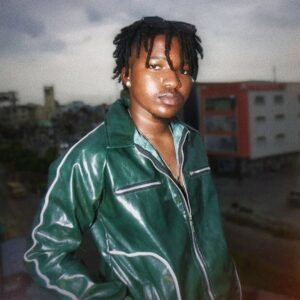
Loye peels back the layers of his journey.
Loye’s story begins in Kaduna, in a home where faith is stitched into daily life. But even that kind of grounding cannot shield him from the blows life deals…..CONTINUE FULL READING>>>>>
After his sister died, his life was disrupted, and he had to leave Kaduna.
In his AsToldTo with Zikoko, Loye peels back the layers of his journey: the struggle with religion, the near-breaking points, the grief and hunger, the brushes with fate that tested him and how he’s slowly rebuilding his faith.
This is Loye’s story as told to Marv.
The day my sister died was the day I began to lose my faith. We lived in Kaduna. Our mother was a prophetess at the Christ Apostolic Church. In church, she told people about their future. Everything she said came to pass. Children feared her. Cheating husbands feared her. Everyone who had sinned in the week feared her because on Sunday, she could reveal their deepest sins. Yet my sister died from a spiritual attack, and my mother could not stop it.
On Sundays, we woke up at 3 a.m., the air heavy with beans and pepper. Steam covered the kitchen. My mother was making moi-moi, which we helped her pack to sell in church.
We wore our best clothes, my combat trousers dusted from under the bed where they had been all week. My mother led the way. Sundays were good—not just because we went to church, but because our mother walked with us. The boys who hung in the corner and tormented my life didn’t attempt to tease me, not when my mother was with us, not when it was safe.
At church, we stood beside our mother as she emptied her cooler of moi-moi.
I was born inside the walls of CAC. As far back as memory reaches, my life was measured in prayers. My mother had us fast for twelve hours twice a week, our small bodies aching with hunger, our lips moving over scripture. Every day meant Bible reading, and every season meant climbing mountains to pray louder, higher, and closer to heaven. Sundays were their own pilgrimage.
I remember one night on the mountain, the air sharp and cold, my body trembling as I wrapped my arms around myself. She told us, “The more uncomfortable you are in the presence of God, the more serious He knows you are about your prayer.” I sat there, teeth chattering, trying to make sense of it, but it never really clicked. It still doesn’t.
When we grew older, my sister moved to Ilorin to live with a relative. But when she returned to Kaduna in 2017, something strange began to happen. My mother said it was a “spiritual attack.”
One morning, my sister woke to her back itching. Initially, it was nothing dramatic, just an irritation she couldn’t ignore. But the itch refused to fade. Day after day, she scratched until her skin gave way to sores.
What started as restless discomfort became raw, open wounds. Her back was covered with bruises and injuries she couldn’t explain. She hadn’t fought anyone, hadn’t fallen, hadn’t been dragged across the ground. The marks appeared as though her own body had turned against her.
The bruise got worse. Our fasting didn’t save her. After a while, my sister died.
It broke something in me. My sister had always worn her faith like an armour. God was the anchor in our home. But as I watched things unravel, that certainty slipped from me.
I kept asking myself how tragedy could strike a family that prayed morning and night, a family with a mother who prophesied, who wore devotion like a second skin.
Days later, I was walking on the streets and couldn’t breathe. I was gasping for air, and somehow I knew that I needed to leave Kaduna to breathe better. In December, I left. I never returned to Kaduna or my mother’s church.
In 2020, I got into YabaTech, and things started to change. I had only just begun to make music. It was nothing too serious. I was just hoping I would blow. Beats were not hard to find. In Yaba, a music studio was easier to find. So, I recorded a few songs that I performed in school during social events; Miss YabaTech, Departmental Night, etc.
Once, I was performing. Then, I heard it out of nowhere: a nudge, a voice whispering, “Step outside.” I couldn’t explain it, but I obeyed. I turned to my friends, urging them to follow, but they only laughed, waving me off. So I walked out alone, the noise of the event fading behind me.
Minutes later, the sound of a gunshot pierced the night. Panic erupted. By the time the dust settled, someone lay dead in the exact spot I had been standing. I just stood there, my chest tight.
My time in YabaTech was tough. I was dead poor, with no money and no place to sleep. Survival felt like a daily negotiation. I went five months with no home, no place to sleep. The school grounds became my bedroom: cold benches, empty classrooms, any corner I could claim for the night.
On some nights, desperation pushed me to sneak into a female friend’s hostel, just to have a roof over my head until morning. My entire wardrobe was four outfits. I’d swap clothes with a friend to keep up appearances, to pretend life wasn’t swallowing me whole.
It was a hard, grinding time, but music kept me breathing through it all.
As word began to spread around campus that I was a musician, I started getting called to small shows, events that barely paid but kept me visible.
Then one night, a group of guys approached me. They wanted me to perform—not at a concert, not at a campus hangout, but at an orgy party, tucked away in a Didi Hotel in Lekki. It was wild, absurd, and completely unexpected, yet it cracked open the path that would change everything for me.
I swore I would make it there. I scraped and saved all week, collecting small change from doing my classmates’ assignments, tucking away every naira to get to where I’d need to perform. By the weekend, I had just enough, and with a friend by my side, I headed for the event.
The club was thick with heat and noise when we arrived. Music throbbed through the speakers, men spraying cash like confetti, women dancing, hips rolling in the neon haze. I waited, clutching my chance, but they kept pushing me aside. “Later,” they said. Always later. Hours passed. By the time they finally called my name, the frenzy had died down. The crowd had thinned to maybe twenty people, their eyes glassy, their energy drained.
Still, I sang. I let the notes rise and fall, wringing every ounce of strength out of my voice, filling the hollow room as if hundreds of people were listening. I sang to the lights, to the smoke curling in the air, to the tired bodies slouched in their seats. And when the last note left my mouth, there was nothing. No clapping of hands. No showering of cash. Only silence; it was heavy and echoed. And I could almost feel the sharp sting of hope draining from me, like sand slipping through open fingers.
Outside the club, it was dark. Discouragement sat on my shoulders like a burden, and I wondered if the singing had been for nothing. Then, out of the blue, a small group of girls walked up to me. They clapped, smiling, their voices soft but certain: they’d heard me, and it mattered. That little spark lit something again.
Not long after, a guy strolled over. “Omo, I get one gig for una with Infinix. I want you guys to come do a freestyle jingle. Don’t worry, I’ll cover transport. I’ll even pay you something small,” he said to my friend and me.
It wasn’t much, but it was a door. And that night, it was the very first one that opened.
Then came another twist. The guy’s girlfriend pulled me aside, her voice low, almost conspiratorial. She said there were some men tucked away in the corner, throwing advances at women, and maybe if I sang for them, I could make a little money. I hesitated, nerves tying knots in my chest, but I went.
At first, my voice wavered, soft and unsure, but the music carried me. Soon, I was singing like I belonged there. One of the men, lounging with his friends, stopped mid-laughter. He leaned forward, eyes narrowing with interest, and said, “This guy good oh. Come, let me see you. Let’s talk.”
We stepped aside, away from the noise, and he looked at me with a quiet seriousness. “My girlfriend just lost her sister,” he said. “I want you to sing for her, lift her spirit. You’ve got a voice that can do that.”
He took my phone number before I slipped back to my seat, and I kept singing, trying to hold on to the night. When I finally wrapped up, his manager appeared, phone in hand, saying he’d been asked to collect my account details. I typed it in, half in disbelief, half in hope.
That same evening, as if fate was lining things up, I met a girl who invited me to her birthday party. She sent me ₦5,000 afterwards. Small money, but it felt like something real. From there, it was back to my friend’s hostel for the night, pulling myself together to head for the freestyle jingle gig at Infinix.
The next day, we made it to the event, did our thing, then circled back again to my friend’s hostel to change.
When we got back, I dialled the man who had asked for my account details, the same one who wanted me to sing for his grieving girlfriend. He said he’d already sent the money. Heart racing, I rushed to the nearest ATM, punched in my card, and waited. Nothing. No alert. No balance change.
Confused, I called him back. “Sir, please, what name did you see when you made the transfer?” He paused, then replied, “Kabir Ali, or something like that.” My stomach sank. “No, sir. My name is Daniel,” I told him.
He didn’t argue. He just said, “No problem,” and within minutes, another transfer hit—this time, it was real. Then he added, “Come by tomorrow.”
One thing led to another, and soon I found myself standing before his grieving girlfriend, singing softly, trying to wrap my voice around her pain. Midway through, she picked up a call. I kept going, unaware of who was on the other end until she tilted the phone slightly — it was M.I. Abaga listening. He paused their conversation just to ask, “Who’s that singing?”
Through the phone, he asked for my number, said he’d reach out. In that moment, my voice had travelled farther than I ever imagined, carrying me into a future I hadn’t even dared to dream.
Two months slipped by, and the campus was already quiet with vacation. I had almost convinced myself M.I. had moved on, that his promise was one of those fleeting words people say in passing. Then, out of nowhere, my phone rang. It was my friend, a fellow student who doubled as my manager back then. Breathless, he said, “M.I.’s been trying to reach you.”
I froze. All that time, I thought I’d been forgotten; he had actually been making plans and setting things in motion. While I was doubting, he was preparing to meet me.
The moment I got the call, I left Epe, where I’d been squatting at a friend’s place for the holiday, and set out for the meeting spot. The journey felt endless, every bump in the road carrying the weight of what might come. By the time I arrived, my heart sank — M.I. was already at the door, about to leave.
But then our eyes met. He paused, looked me over, and asked, “You’re Loye, right?” I nodded, breath caught in my chest. He held the door open. “Come in. Let’s talk.”
We sat across from each other, the air charged with possibility, and the conversation began to flow. At one point, he leaned in and asked, “Tell me, who would you love to work with?” The names tumbled out of me: Don Jazzy, Olamide, and a handful of other giants who shaped the sound of the industry.
Without hesitation, he picked up his phone, reaching out to them one after the other. Calls were made, bridges tested. But the timing wasn’t right. None of them were ready to bring someone new on. Don Jazzy’s offer came closest. He said I could spend two years in the incubator, sharpening myself under artist development.
Two years. On the surface, it sounded like an opportunity, almost a blessing. But to me, it felt like a lifetime. I was too restless, too starved for something that could change my life now. Nights of curling up on hard benches, mornings waking in borrowed corners, days spent moving from one friend’s space to another, they had stripped me of patience.
Not long after, M.I. reached out again. Another meeting. Another chance.
When we finally sat down, he looked me in the eye and asked, “Where do you stay?” The question cut deeper than I expected. I told him the truth, that I didn’t really have a place of my own, that most nights I squatted at my manager’s house, drifting between borrowed spaces.
Out of nowhere, he did something I never expected. He got a hotel room for me and my friend and told us, “Stay here for two weeks. Use the time to find an apartment.”
That was how I stepped into my very first place: a two-bedroom flat that felt like a palace after years of drifting. Everything began to unfold like a dream, one door after another swinging open.
Soon after, I signed with Incredible Music, the label M.I. created after he met me. For the next two years, I lived in the cocoon of artist development, sharpening every edge of my craft. I recorded hundreds of songs, each one a small breakthrough, each one teaching me something about who I was becoming. I even cut an EP with Chopstixx, one of the biggest producers, which is not out yet.
One day, without thinking, I said, “Alhamdulillah.” It means “God is great.” I have come to believe that beyond every doubt, what happened to me was divine orchestration. I have not returned to church yet, but the experience made me return to God…..CONTINUE FULL READING>>>>>


